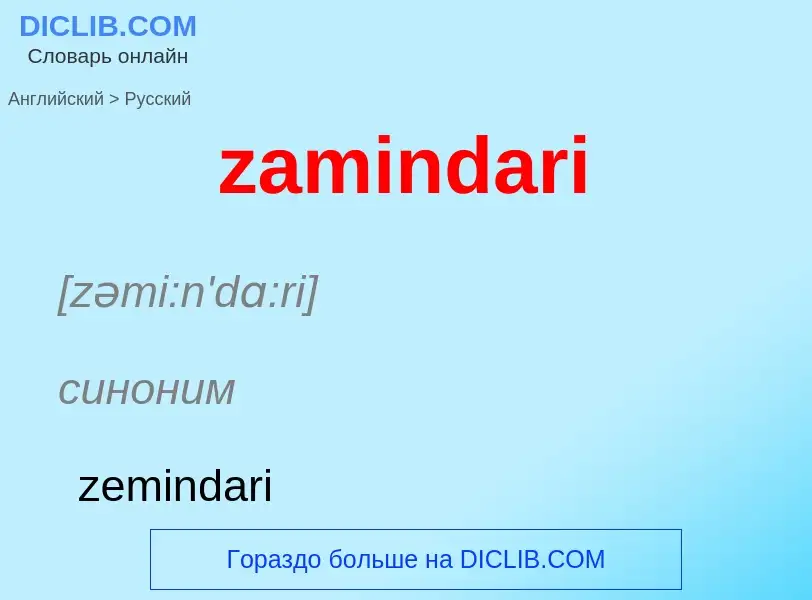Traducción y análisis de palabras por inteligencia artificial ChatGPT
En esta página puede obtener un análisis detallado de una palabra o frase, producido utilizando la mejor tecnología de inteligencia artificial hasta la fecha:
- cómo se usa la palabra
- frecuencia de uso
- se utiliza con más frecuencia en el habla oral o escrita
- opciones de traducción
- ejemplos de uso (varias frases con traducción)
- etimología
zamindari - traducción al ruso
[zəmi:n'dɑ:ri]
синоним
[zəmi:n'dɑ:]
синоним
[zəmi:n'dɑ:]
существительное
история
заминдар
Индия
земельный собственник
Definición
Wikipedia

A Zamindar (Hindustani: Devanagari: ज़मींदार, zamīndār; Persian: زمیندار, zamīndār) in the Indian subcontinent was an autonomous or semi-autonomous ruler of a province. The term itself came into use during the reign of Mughals and later the British had begun using it as a native synonym for “estate”. The term means Landowner in Persian. They were typically hereditary, and held the right to collect tax on behalf of imperial courts or for military purposes. During the period of British colonial rule in India many wealthy and influential zamindars were bestowed with princely and royal titles such as Maharaja, Raja/Rai,Malik, Chaudhary, Nawab and Sardar.
During the Mughal Empire, zamindars belonged to the nobility and formed the ruling class. Emperor Akbar granted them mansabs and their ancestral domains were treated as jagirs. Some zamindars were Hindu by religion and Brahmin or Kayastha or Rajput by caste. During the colonial era, the Permanent Settlement consolidated what became known as the zamindari system. The British rewarded supportive zamindars by recognising them as princes. Many of the region's princely states were pre-colonial zamindar holdings elevated to a greater protocol. The British also reduced the land holdings of many pre-colonial princely states and chieftaincy, demoting their status to a zamindar from previously higher ranks of nobility.
The system was abolished during land reforms in East Pakistan (Bangladesh) in 1950, India in 1951 and West Pakistan in 1959.
The zamindars often played an important role in the regional histories of the subcontinent. One of the most notable examples is the 16th-century confederation formed by twelve zamindars in the Bhati region (Baro-Bhuyans), which, according to the Jesuits and Ralph Fitch, earned a reputation for successively repelling Mughal invasions through naval battles. The zamindars were also patrons of the arts. The Tagore family produced India's first Nobel laureate in literature in 1913, Rabindranath Tagore, who was often based at his estate. The zamindars also promoted neoclassical and Indo-Saracenic architecture.


![''circa 1898-1901''. Jagirdar Mustafa Ali Khan ''rais'', a prominent zamindar (with the honorary title of Nawab) of old city [[Bareilly]] (United Provinces) British India. ''circa 1898-1901''. Jagirdar Mustafa Ali Khan ''rais'', a prominent zamindar (with the honorary title of Nawab) of old city [[Bareilly]] (United Provinces) British India.](https://commons.wikimedia.org/wiki/Special:FilePath/Jagirdar Mustafa Ali Khan, a prominent zamindar of Bareilly British India.jpg?width=200)
![Burdwan Raj]]) as a young man, {{circa}} 1840–45 AD. Burdwan Raj]]) as a young man, {{circa}} 1840–45 AD.](https://commons.wikimedia.org/wiki/Special:FilePath/Mehtab Chand of Burdwan.jpg?width=200)
